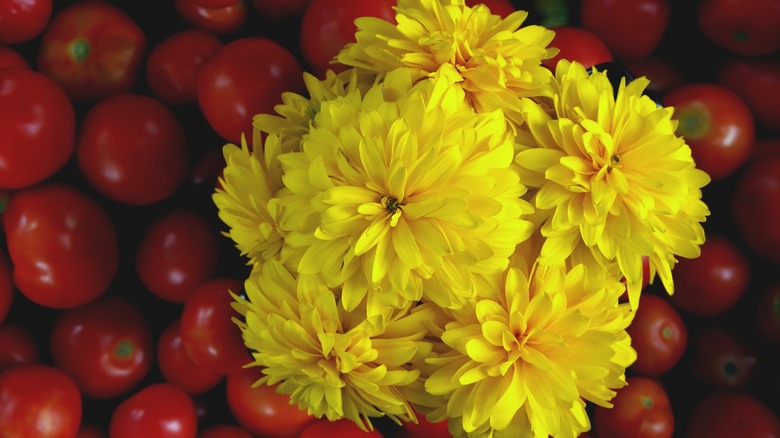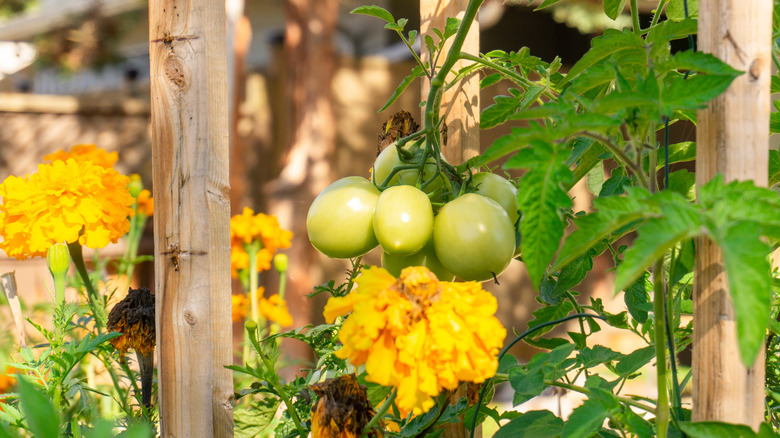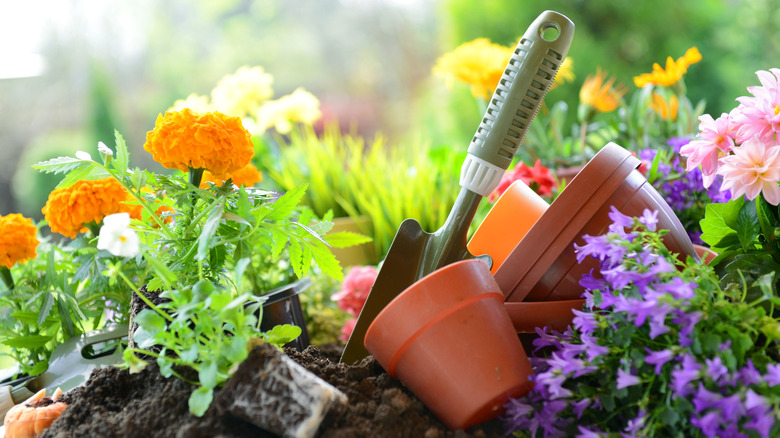Why Tomatoes And Dahlia Shouldn't Mix In The Garden
While both are beloved plants that offer countless bounties for a variety of reasons, unfortunately, tomatoes and dahlias should not be planted near each other in the garden. For starters, tomatoes are susceptible to a variety of diseases, such as blight and wilt, which can easily spread to other plants in close proximity. Dahlias, on the other hand, are also prone to these diseases and can become infected if planted too close to tomatoes. Secondly, both tomatoes and dahlias have different growth habits and nutrient requirements. Tomatoes are heavy feeders and require a lot of nitrogen, while dahlias prefer a more balanced fertilizer with less nitrogen. Planting them together can result in competition for nutrients, leading to stunted growth and reduced yields for both plants.
To maintain the health of both tomatoes and dahlias while keeping them away from each other, it is recommended to keep them apart in your garden. The distance will help minimize the risk of disease transmission and allow each plant to receive the necessary nutrients without competition. Additionally, practicing good garden hygiene is crucial. This includes regularly removing any diseased leaves or plants, as well as cleaning gardening tools to prevent the spread of pathogens. Providing adequate spacing between plants and ensuring proper air circulation can also help reduce the risk of disease.
Best companion plants for tomatoes
While you should avoid planting dahlias near tomatoes, there are a number of plants that actually thrive in the vicinity of these large, red fruits. Basil is an excellent companion plant for tomatoes because it helps repel pests such as aphids, whiteflies, and tomato hornworms. Its strong aroma acts as a natural deterrent, keeping these harmful insects away from the tomato plants. Additionally, basil can enhance the flavor of tomatoes when used in cooking, making it a perfect pairing in the garden.
Marigolds are another great companion plant for tomatoes. They release a strong scent that repels nematodes, a type of microscopic worm that can damage tomato roots. By planting marigolds around tomato plants, gardeners can help protect the tomatoes from these harmful pests. Marigolds also attract beneficial insects like ladybugs, which feed on aphids and other pests that may attack tomatoes. Furthermore, the vibrant colors of marigolds can add beauty and a complementary pop of color to the garden.
Finally, borage is a beneficial companion plant for tomatoes due to its ability to attract pollinators, such as bees and butterflies. These pollinators play a crucial role in the fertilization of tomato flowers, leading to better fruit and higher yields. Borage also has deep roots that help improve soil structure and nutrient uptake, benefiting the neighboring tomato plants. Additionally, borage leaves can be used as a natural mulch, helping to retain moisture in the soil and reduce weed growth.
Best companion plants for dahlias
Don't fret, for your dahlias also have many friends that grow well as neighbors. Rosemary is a great companion plant for dahlias due to its ability to repel pests and attract beneficial insects. Rosemary has a strong scent that acts as a natural deterrent for pests such as aphids, spider mites, and cabbage loopers, protecting the dahlias from these harmful insects and reducing the risk of infestation. Furthermore, rosemary is a perennial herb that requires similar growing conditions as dahlias, such as full sun and well-drained soil.
Coneflower is another excellent companion plant for dahlias. Coneflowers are known for their ability to attract pollinators, particularly bees and butterflies. By planting coneflowers near dahlias, it can help attract these beneficial insects to the garden, which can enhance the pollination of the dahlias, resulting in larger and more abundant blooms. Additionally, coneflowers have deep taproots that help improve soil structure and drainage. This can benefit the dahlias by providing them with a well-drained soil environment, which is essential for their growth and development.
Finally, zinnias are a popular choice as companion plants for dahlias due to their ability to provide shade to the base of dahlia plants, helping to keep the soil cool and retain moisture. This is particularly beneficial during hot summer months when dahlias may be susceptible to heat stress. Furthermore, the combination of zinnias and dahlias creates a vibrant and diverse display of flowers in the garden, adding visual interest and attracting attention.


